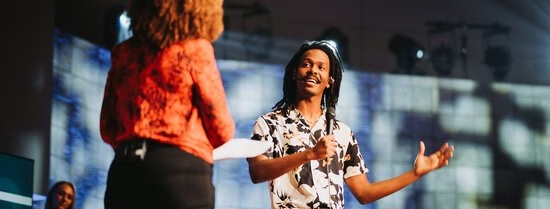The new academic year of Erasmus University Rotterdam (EUR) was opened on September 6. Thousands of students took the first step in their academic career today and thousands more continued their studies after a well-deserved summer break.
During the opening ceremony the deep-rooted and very successful cooperation between the EUR and the city of Rotterdam, social partners and the business community was highlighted. Guests included Prof. Dr. Kim Putters, President of the Executive Board Prof. Dr. Ed Brinksma, Prof. Dr. Rob Zuidwijk and alumna Machtelt Groothuis. Singer Jeangu Macrooy gave a special performance, and we were also introduced to our new Rector Annelien Bredenoord. She will start on 1 October.

Broad Prosperity as the starting point for solutions to social problems
President of the Executive Board Prof. Ed Brinksma and Director of the Netherlands Institute for Social Research (SCP) Prof. Kim Putters spoke about the importance of science and scientists in solving social problems. Kim Putters: "The Netherlands is actually doing quite well. The economy is showing great resilience and we seem to be emerging from the crisis in a reasonable way, but not everyone is. It's not just about economic capital, but also about personal and social capital. You're talking about a broader welfare perspective."
Kim Putters addressed the role of science in this: "Scientists may take a step forward. Self-aware science is science that not only tries to interpret and understand, but also looks to the future and comes up with solutions. Social issues are often complex and there is a great need to understand these issues. Without science, there is no social progress. This is also where students have a role, but also residents of a city."
"Making positive social impact and solutions for the future"
Ed Brinksma
President of the Executive Board

Ed Brinksma: "It is important that we as a university have an entrepreneurial attitude ourselves. That we don't wait for someone to ask us something but that we ourselves take a step forward. For real solutions in society it is important that we do not see technical sciences as separate from behavioral sciences and that we see the Alpha and Beta sciences as equivalent. We need each other. And we also attach great value to successful collaborations with the city of Rotterdam, the business community, and other social partners. It's not just about scientific excellence, but above all about making an impact."
Investment fund for measurable social impact
Machtelt Groothuis is an alumna of the EUR and co-founder of Rubio Impact Ventrures, an investment fund that focuses entirely on companies that make a measurable social impact. In addition, Groothuis is one of the initiators of the Graduate Enterpreneur Fund and 'founding donor' of the Entrepreneurial Women Fund, both from the Erasmus Trust Fund. Groothuis: "I hope that we maintain equality in the Netherlands and that inequality does not increase. It is important to come up with solutions that benefit everyone. Like the apps that exist for sharing food with each other. That way you prevent food waste and people come together."
"Make sure your thesis is about solutions for society"
Prof. dr. Rob Zuidwijk

Prof. Dr. Rob Zuidwijk is an alumnus of the EUR and currently working as Professor of Global Supply Chain and Ports at the Rotterdam School of Management (RSM) and Academic Director of the Erasmus Centre for Urban Port and Transport Economics. Rob Zuidwijk discussed the importance of making connections. Between science and society, but also connections between major social changes such as the climate crisis. The port needs the university for solutions. Rob Zuidwijk: "What effect does emissions reduce in the port have on respiratory infections in Rotterdam? It's important to know these things so we can work on solutions." He also gives another advice to all students: "Make sure your thesis makes a difference. That it doesn't just contain theory, but that your thesis is really about solutions for society."

EUR awards for teachers and students
Traditionally, several prizes were awarded at the opening of the academic year. The Research Prize was awarded to Dr. Tina van der Vlies for her research that has great social impact. With her history research, Tina provides knowledge to better understand the world, analyze problems and arrive at solutions.
The Education Award, an award for teachers who are an inspiration to students. This year's award was won by Dr. Ana Uribe Sandoval, lecturer of the Department of Media and Communication at the Erasmus School of History, Culture and Communication.
The Lambers Student Excellence Award was presented this year to no less than two inspiring and ambitious students, Ina Jäntgen (Philosophy and Economics) and Charlie Sewalt (Medicine).
With Strategy 2024, Erasmus University made a promise to have a positive impact on society and in doing so we set the goal to be an Eco-positive university. Nicole Hunfeld (Erasmus MC) won the Sustainability Award for her commitment to the Green Intensive Care project.
Finally, the Student Societal Impact Award was won by Max Wagenaar and Emma Peters from the student initiative Erasmus Verbindt, who strengthen the relationship between the Erasmus University and the city of Rotterdam with a lot of initiative, decisiveness and leadership.

Resilience is what we need
After a varied program, the meeting looked ahead to the 2021-2022 academic year. President of the Executive Board Ed Brinksma: "Life both personally and in general is characterized by our ability to overcome crisis and the belief that we can do so. Resilience is what we need. Universities play an essential role in developing human resilience. As developers and guardians of science, universities play a crucial role in developing human resilience. We must move beyond the political correctness around multi-disciplinarity and truly bring disciplines together research and education for the benefit of the great societal challenges. And we must learn to use this knowledge effectively to design solutions."

